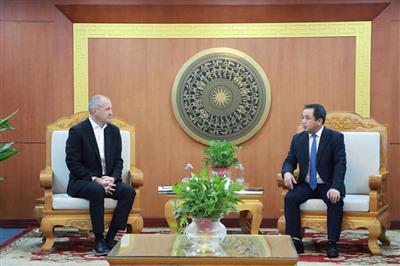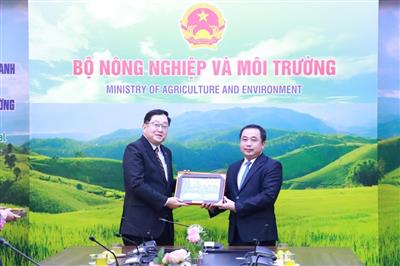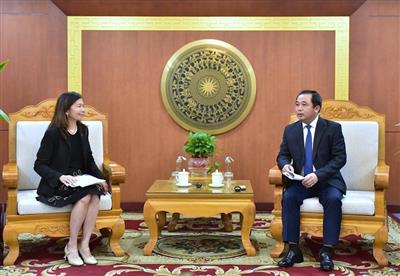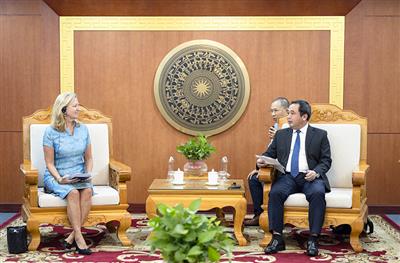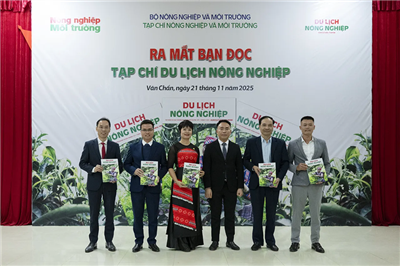
Vietnam announces Updated National Adaptation Plan for Climate Change (NAP)
20/11/2024TN&MTOn November 19, at the 29th Conference of the Parties to the United Nations Framework Convention on Climate Change (COP29) in Azerbaijan, Deputy Minister of Natural Resources and Environment, Mr. Le Cong Thanh, presided over a significant event. This event marked the announcement of Vietnam's updated National Adaptation Plan for Climate Change for the 2021-2030 period, with a vision to 2050 (NAP).
Vietnam now joins 59 other nations that have completed and published their NAPs, marking a significant milestone in enhancing the resilience of its natural systems, economy, society, and communities to climate change (CC). Organized in collaboration with the United Nations Development Programme (UNDP), the event attracted government leaders, climate experts, multilateral funds, and development partners.

Deputy Minister of Natural Resources and Environment, Mr. Le Cong Thanh, speaking at the event
In his opening remarks, Deputy Minister Le Cong Thanh emphasized that climate change adaptation is a critical component of global efforts to address climate change, aiming to protect people, livelihoods, and ecosystems, especially in developing countries.
Vietnam has enacted numerous policies and implemented various measures to strengthen its resilience to climate impacts. Following guidance from the United Nations Framework Convention on Climate Change (UNFCCC), Vietnam developed and implemented its first NAP in 2020. This plan includes a national monitoring and evaluation system for adaptation activities and identifies priority tasks and solutions for seven vulnerable sectors.
Based on practical experience and achievements from 2020–2023, as well as Vietnam’s new climate commitments, the NAP has been thoroughly reviewed and updated. This process involved active participation from ministries, local governments, research institutions, non-governmental organizations, and development partners.

Ms. Rohini Kohli, Senior Technical Advisor on Climate Change Adaptation Policy and Planning, United Nations Development Programme, delivering remarks at the event
Despite mobilizing substantial domestic resources, Vietnam—like many developing nations—faces significant challenges in technology, capacity, expertise, and funding. Government budgets alone remain insufficient to address the urgent needs of communities.
“The priority tasks identified in the updated NAP are cross-sectoral and interregional, requiring significant technical and financial resources for effective implementation. Therefore, Vietnam calls for cooperation and support from countries, international organizations, and businesses to transfer advanced technologies, provide access to concessional financing, and implement concrete measures to strengthen resilience in vulnerable communities and sectors,” emphasized Deputy Minister Le Cong Thanh.
The updated NAP aligns its specific objectives and priority tasks with the National Climate Change Strategy to 2050, the updated Nationally Determined Contributions (NDCs), and other sectoral development strategies and plans.
It outlines 162 priority tasks across three main objectives:
- Enhancing the resilience and adaptive capacity of natural, economic, and social systems to ensure sustainable livelihoods (76 tasks).
- Reducing disaster risks and minimizing damage caused by natural hazards and extreme climate events, contributing to loss and damage mitigation (33 tasks).
- Improving institutional frameworks and mobilizing resources to adapt effectively to climate change (53 tasks).
These tasks aim to reduce vulnerabilities, enhance resilience, and build adaptive capacity in climate-impacted sectors such as natural resources and environment, agriculture, disaster prevention, construction, transportation, industry and trade, culture, information, and social welfare. The plan also prioritizes reducing damage from natural disasters and extreme climate events, addressing loss and damage, and strengthening institutional frameworks for effective climate adaptation.

Vietnamese representatives presenting the updated National Adaptation Plan (NAP) for Climate Change
The updated NAP introduces specific tasks and solutions, including sustainable livelihood models and adaptation approaches based on nature (NbA), ecosystems (EbA), and communities (CbA). It also highlights the importance of attracting private-sector investment, as well as engaging youth, women, and communities in climate adaptation efforts.
Speaking at the event, Ms. Rohini Kohli, Senior Technical Advisor on Climate Change Adaptation Policy and Planning at UNDP, highlighted the importance of swift and effective adaptation for Vietnam. She stated: “As a highly vulnerable nation, Vietnam faces increased risks from climate change impacts, particularly in already at-risk communities. The updated NAP is a milestone that opens opportunities to address potential losses and damages while mobilizing critical resources for a resilient future. Vietnam must also take a proactive role in international negotiations on loss and damage to contribute to equitable and effective solutions through multilateral cooperation. UNDP remains committed to supporting Vietnam in attracting national and international financial mechanisms.”
During the event, speakers and participants discussed Vietnam's climate adaptation strategy, key priorities, and the critical need for sustainable financing to address significant challenges in protecting vulnerable populations and ecosystems.
Ngoc Huyen (NRE Newspaper)





